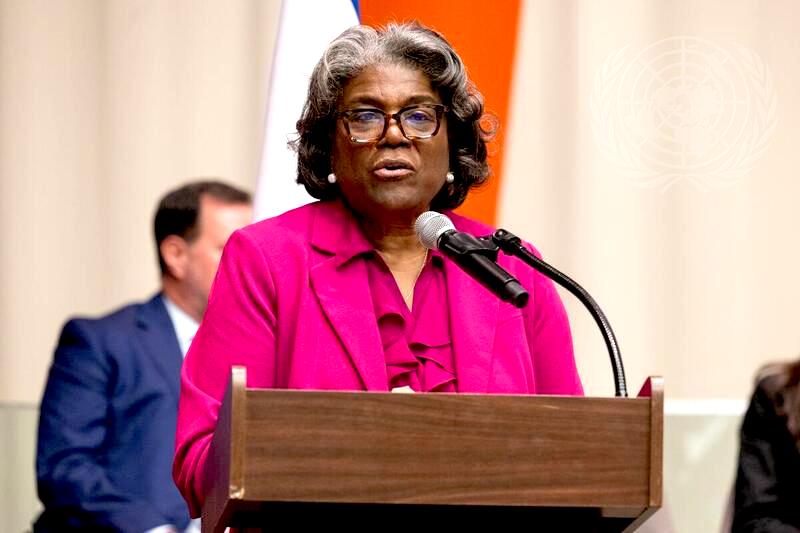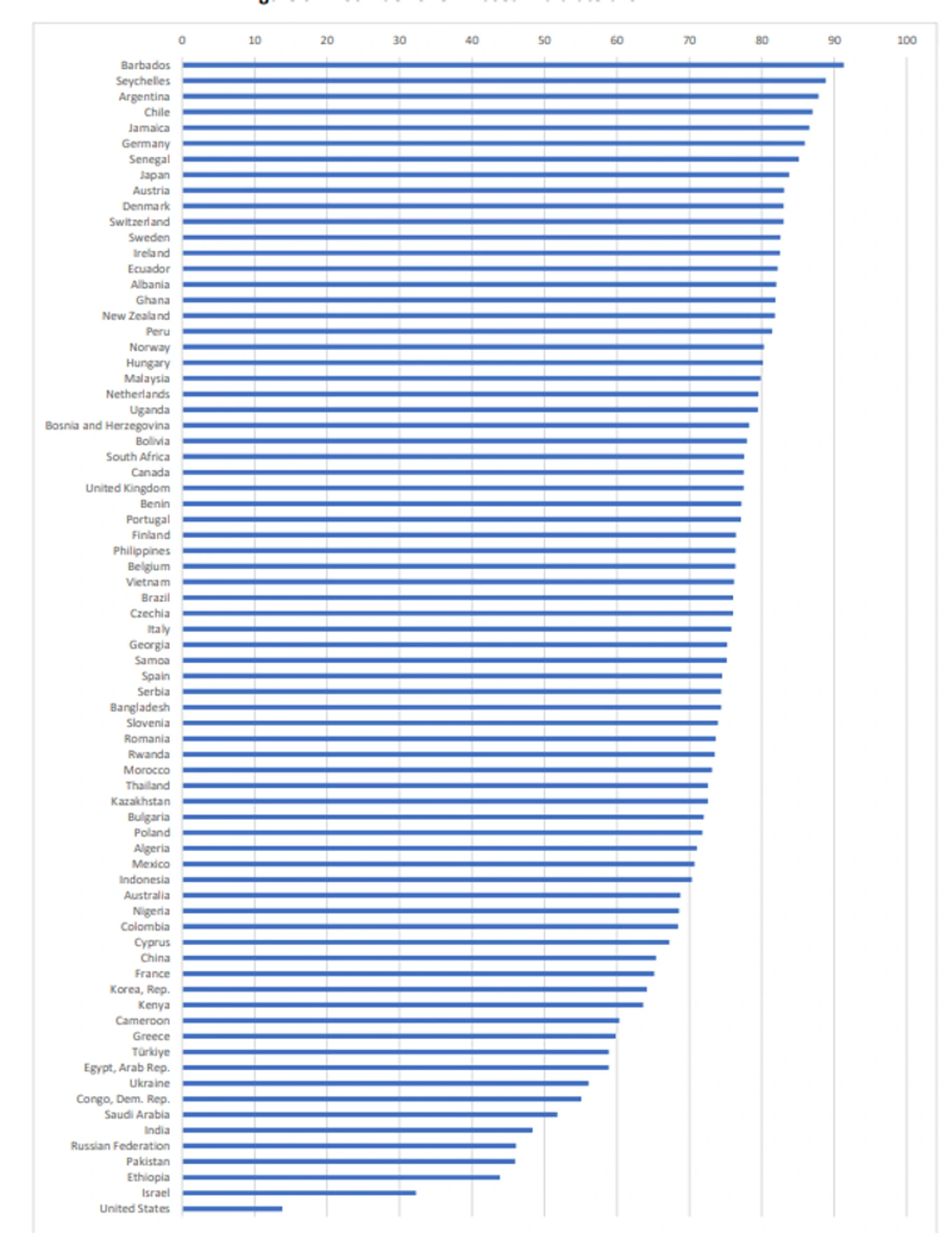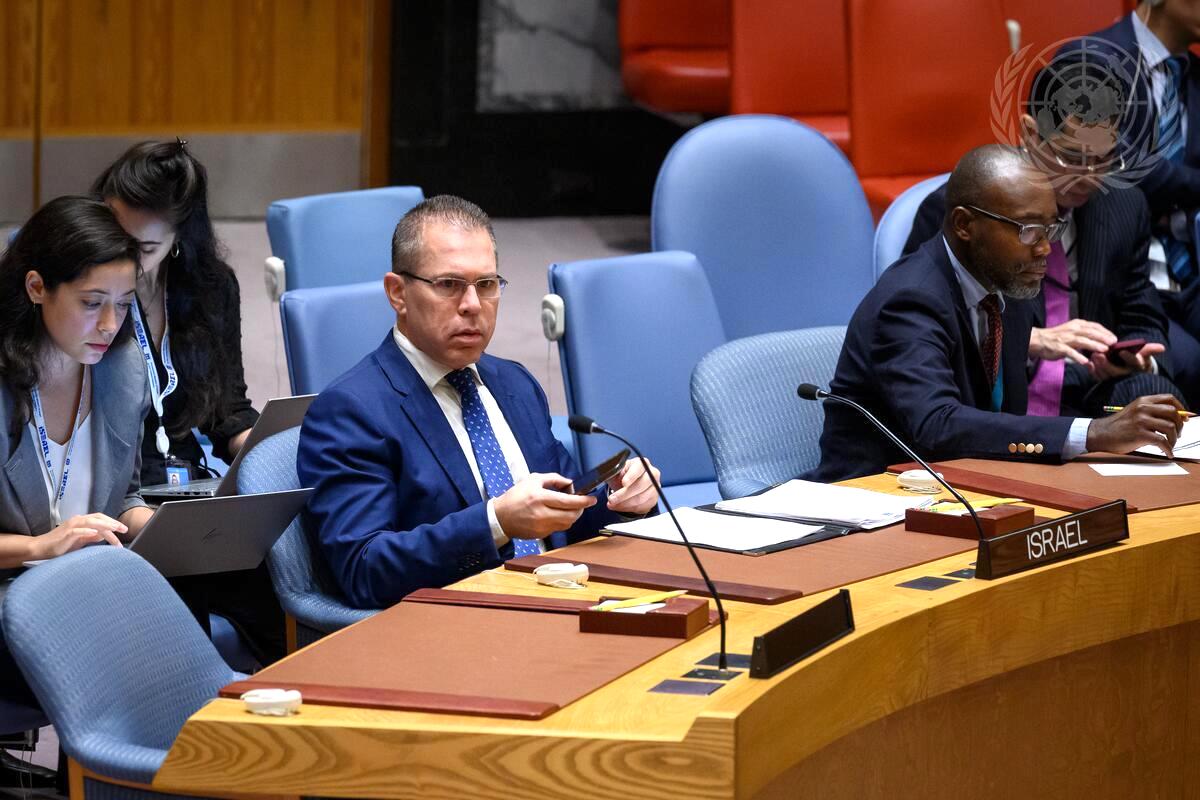At the head of a multilateralism ranking is Barbados, with a voting record that Jeffrey Sachs and Guillaume Lafortune commend as a global model. War, climate, sanctions and the Cuban blockade put the U.S. in last place.

Linda Thomas-Greenfield, U.S. ambassador to U.N. on Oct. 13. (UN Photo/Manuel Elías)
By Jeffrey D. Sachs and Guillaume Lafortune
Common Dreams
 As part of our academic research on how to achieve the Sustainable Development Goals (SDGs), we are examining the extent to which U.N. member states adhere to the U.N. Charter and U.N.-backed goals such as the SDGs.
As part of our academic research on how to achieve the Sustainable Development Goals (SDGs), we are examining the extent to which U.N. member states adhere to the U.N. Charter and U.N.-backed goals such as the SDGs.
Towards this end, we have created a preliminary “Multilateralism Index” and welcome feedback and suggestions. The ranking of 74 countries according to the Multilateralism Index is shown below.
Barbados ranks highest, the U.N. member most aligned with the U.N. Charter. Though Barbados is a very small country, with just 280,000 people, its peaceful multilateralism gives it a big voice.
Barbados’ globally respected Prime Minister Mia Mottley, recently teamed up with French President Emmanuel Macron to co-host the Summit for a New Global Financing Pact for People and Planet, in Paris this past June.
This summit built on Barbados’ Bridgetown Initiative — named after the Barbados’ capital city — to reform the Global Financial Architecture to enable vulnerable countries cope with climate change.
"We cannot save the planet with a quarter or half the people working together, we need the majority." @miamottleyshawl Prime Minister of Barbados #ParisPeaceForum2023
Le Live : https://t.co/3jJOpMyO86 pic.twitter.com/psK29gn0D3
— Paris Peace Forum (@ParisPeaceForum) November 10, 2023
At the very bottom of the ranking of 74 countries is the United States, with Israel being the second from the bottom. Both countries are frequently at odds with the U.N. multilateral system, as is so evident these days.
Regime Change & War
The U.S. fails to adhere to the U.N. Charter in several ways. The starkest is the many wars and regime change operations that the U.S. has led, without any U.N. mandate and often against the will of the U.N. Security Council.
In 2003, the U.S. tried to get the U.N. Security Council to vote for a war against Iraq. When the Security Council opposed the U.S., the U.S. launched the war anyway. As events later proved, the U.S. ostensible reason for launching the war, Iraq’s possession of weapons of mass destruction, did not even exist.
The U.S. has engaged in dozens of covert and overt regime-change operations that violate the letter and spirit of the U.N. Charter. One important study finds 64 covert regime change operations by the U.S. during the Cold War, 1947-1989. There have been many well-known U.S. covert operations since then.

(2023 Multilateralism Index, based on research by Jeffrey D. Sachs, Guillaume Lafortune and Eamon Drumm)
Climate Goals
The U.S. also goes it alone on issues of sustainable development. In 2015, all 193 U.N. member states adopted the SDGs to guide national policies and international development cooperation during the period 2016-2030.
Every U.N. member state is supposed to present its national SDG plans, challenges and achievements to the other nations, in a presentation called the Voluntary National Review, or VNR.

Israel’s U.N. Ambassador Gilad Erdan on July 27, during a Security Council meeting on the Middle East. (UN Photo/Loey Felipe)
So far, 188 of the 193 U.N. member states have presented VNRs, sometimes more than once. Barbados, for instance, presented two VNRs in 2020 and 2023. Yet five countries have never presented a single VNR: Haiti, Myanmar, South Sudan, Yemen, and yes, the United States of America. South Sudan and Yemen are now on the list of countries to present a VNR in 2024, but not the U.S.
At this stage, the Multilateralism Index covers 74 of the 193 U.N. member states, the group for which we have collected extensive data on the governments’ efforts to achieve the SDGs. The Multilateralism Index is positively correlated with those SDG efforts, that is, countries abiding by U.N. processes (according to the Index) also demonstrate a strong commitment to the SDGs.
The Multilateralism Index is based on five indicators.
The first is the proportion of U.N. treaties between 1946 and 2022 that each country has ratified. As an example, Barbados has ratified more than 80 percent of major U.N. treaties, while the U.S. has ratified less than 60 percent.
The second is each country’s deployment of unilateral economic sanctions (sometimes called “unilateral coercive measures”) not approved by the U.N..
The U.N. General Assembly proclaimed in 1974 that “no State may use or encourage the use of economic, political or any other type of measures to coerce another State in order to obtain from it the subordination of the exercise of its sovereign rights.”
The third measures each country’s membership in major U.N. organizations.
The fourth measures each country’s militarization and inclination to resort to war. The indicator draws on the excellent work of the Global Peace Index.
The fifth measures each high-income country’s economic solidarity with poorer nations, according to its Official Development Assistance (ODA) as a percent of the Gross National Income (GNI).
According to a resolution of the U.N. General Assembly in October 1970, high-income countries are supposed to devote at least 0.7 percent of GNI to ODA. The U.S., by contrast, devoted just 0.22 percent in 2022.
We combine these five indicators to produce the Multilateralism Index.
Our index, which is based on data up through 2022, has shown its predictive power. In recent weeks, in vote after vote, we have witnessed America’s self-isolation within the U.N.. To be multilateral within the U.N. system, after all, means to abide by U.N. precepts and the voice of the global community.
US Veto of Ceasefire in Gaza
On Oct. 18, the U.S. stood alone in the U.N. Security Council, when it deployed its veto to stop a resolution calling for a humanitarian ceasefire in Gaza. The vote was 12 voting yes, two abstentions and the U.S. alone vetoing the measure.
Cuban Blockade
Similarly, on Nov. 2, the U.N. General Assembly adopted Resolution A/78/L.5, which calls on the United States to end its long-standing economic, financial, and commercial embargo on Cuba. To put it mildly, this was not a close vote: 187 countries voted in favor of the resolution, while only the United States and Israel voted against.
Ukraine abstained, and three countries did not vote. Thus, the vote was 187 saying yes, two no, and one abstention. This year’s resolution follows 30 similar resolutions, dating back to 1993. The United States has ignored every single one of those U.N. General Assembly resolutions.
In a deeply interconnected and interdependent world, facing unprecedented and complex crises ranging from pandemics to wars to climate change, the need for multilateralism under the U.N. Charter is more urgent than ever.
No government can do it alone. Barbados sets the highest standard for others to achieve. The U.S. needs to recognize that the U.N. system, operating under the U.N. Charter, is the true “rule-based international order.”
Jeffrey D. Sachs is a university professor and Director of the Center for Sustainable Development at Columbia University, where he directed The Earth Institute from 2002 until 2016. He is also president of the U.N. Sustainable Development Solutions Network and a commissioner of the U.N. Broadband Commission for Development.
Guillaume Lafortune is vice president and head of the Paris office at the U.N. Sustainable Development Solutions Network (SDSN) — the largest global network of scientists and practitioners mobilized for the implementation of the Sustainable Development Goals (SDGs)
This article is from Common Dreams.
Views expressed in this article and may or may not reflect those of Consortium News.

The antithesis in the face representing the first of all the worst, in the so-called United Nations is stark; embodying much more serious consequenes than raucous racist entertainment value.
Career before commitment to moral principles is the nature of the American beast!
Good article which confirms a lot of the vague perceptions I previously had regarding the U.S.’ relationship with the UN. It’s so damn frustrating to become aware of the utter hypocrisy that the US (of which I’m a lifelong citizen) exercises with the UN, using it as a faux justification when they can twist the facts around to seemingly support their actions. Essentially, the US has become a rogue state, especially under the reign of the neo-cons starting around 1980. What more needs be said after ‘W’ (think Dick Cheney’) whimsically appointed near-psycho John Bolton to be Ambassador to the UN in 2005 after Bolton had once said that if the U.N. headquarters “lost ten stories, it wouldn’t make a bit of difference.”
Well spoken!
Three comments, you have to be kidding me.
Ok, I’ll bite – open letter to the voters of America:
Wake up, those of you in the west, you must wake the hell up.
Fighting endless wars devoid of any meaningful advancement of social of human values because they are created by forces that undermine their social fabric, no matter of it’s condition, to disrupt the advancement of the people of the region, for fun and profit.
The treasure blown up and burned, the lives lost and time wasted could be obviously better spent solving the human crisis caused by climate change.
All these issues never addressed by leadership with the urgency and dedication required to, at the very least, make an honest attempt to work positively on solutions.
By a group of super wealthy faux leaders who tout law and order, just as long as they get to judge who is guilty of what according to their political take on any given particular day.
Anybody want to buy a ticket for a ride in space – ? Sorry chump you cannot afford one!
My life occurred during a time when the U.S.A. presented itself at a peace maker and world leader. A stand that when the facts were revealed and there true nature known, showed a marked disparity between truth and fiction.
I’m sure the U S.A. did not rank last during those years. Ranking last in an organization that seeks to, by it’s mission to Maintain International Peace and Security is a warning.
Thanks for high lighting this.
Thanks CN, Jeff & Guillaume
Almost all chains of causality lead back to stockholders, investors and speculators.
It’s the rich who constitute the driving force, the fuel for an engine of evil.
It’s not the media and the politicians. They’re owned by the rich. The rich hold the reins.
Once you have enough money in “the market” it changes everything about how you think.
It’s a transformation akin to a gambling or heroin addiction.
Anything that affect your stocks positively is good, anything that drives them down is bad. Plain and simple. Anything can and will be rationalized.
Therefore, if you want to break the system, you have to remove this engine.
Capital for the productivity of industry has to come from somewhere else.
Because the way it is now it justifies inhumanities as bad as any in history.
So that calls for drastic measures.
I have said that I think what should happen to the Stock Market is what Norquist said he wanted for the Gov’t – to be shrunk small enough so you could drown it in a bathtub …
I am very glad to have this data. Thank you it. Some people have their backs way up over the protesters at the Democratic Party rendezvous. With audacity to insist on Ceasefire Now! And Fire Panteleo! And “from the river to the sea.” Finally, some genuine life from the usually quasi somnolent citizenry?Maybe enough such caterwauling will shake up the arrogant self-satisfied corporatized Democratic Establishment. Frustrating their admonitions to be quiet, not divisive (because the world will otherwise end) and polite (suckers?).
It seems to me the only thing that will shake up that Est is to consistently lose at the polls in ever increasing numbers to a Party to the Left of it (we have had that opportunity for, well, decades now) at which point they will know they either need to shape up or they will disappear – it wouldn’t be the first time a “major” Party disappeared – such 3rd Parties do exist and have been on the ballot for decades, but we don’t vote for them – we are bullied into the LOTE (lesser of 2 evils) which the Ds claim to be, because they have convinced us TINA (there is no alternative) to those awful, awful Rs – one of the biggest most destructive political lies around …
“One important study finds 64 covert regime change operations by the U.S. during the Cold War, 1947-1989.”
As an American who was alive during most of that time, I am very sad to realize that it was not just the Soviets and the KGB who were orchestrating or trying to orchestrate regime changes. The big bad Soviets who we always heard about and who were always considered to be a threat and a danger. Very sad to realize that regime changes were orchestrated by America, which was ostensibly all about freedom and democracy.
You should read Bridge of Courage by Jennifer Harbury for an incredibly bloody example. We basically slaughtered 200,000 civilians in Guatemala in the 1980’s while nobody talked about it.
The rule of law? How quaint. This is the Law of the Jungle. Speaking of Cuba, the late Fidel Castro understood this many decades ago.
The US is the imperial hegemon, if other countries don’t like it and fight back, they will get “sanctioned” unilaterally, which is illegal (assets, cash stolen, trade blocked, and/or placed under siege warfare), regime changed, or even bombed into the Stone Age. The law and taxes are only for the “little people” after all.
The US is institutionally corrupt as well: unlimited political bribery is legal (see Citizens United), financial fraud is largely legal (mortgage fraud, stock buy-backs, naked short selling etc.). The US govt ignores its own laws when not convenient, the AECA is a glaring example, especially in light of recent heavy weapons shipments to KSA, Ukraine and Israel.
International agreements, once ratified by the Senate and signed by POTUS, are the law of the land. These are routinely ignored. The abrogation of the UN Charter and a whole raft of other laws, reflect the overall corruption that will eventually lead to the collapse of American Empire. This may take more decades, or maybe sooner – if we survive the process.
Remember – “no one is above the law” *
* except the US and our “allies”